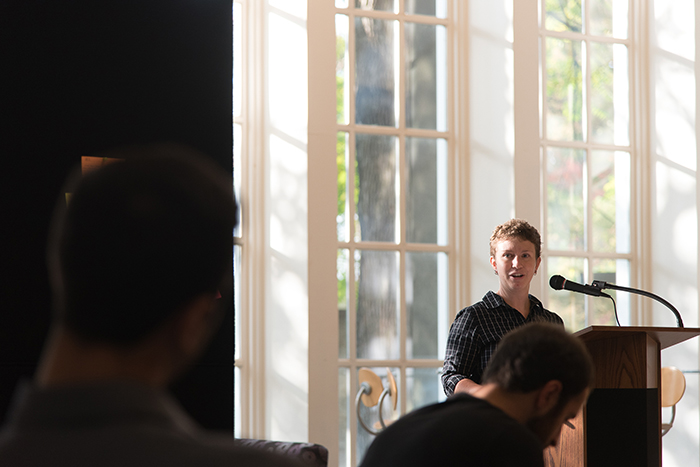Dickinson College's Course Design Collaboratory Helps Professors Stay Ahead of Curve

Sarah Niebler, assistant professor of political science, was among the 14 professors and administrators who shared expertise during the Course Design Collaboratory. Above, Niebler presents during a 2016 FaculTea event.
Winter-break workshop gives professors a chance to fine-tune syllabi before new semester begins
by MaryAlice Bitts-Jackson
Let’s say you’re gearing up to lead a new course. Maybe you’ve read about information literacy, academic technology or inclusive instruction, and you’re eager to learn about how you can incorporate these elements into that intro class you’re teaching this spring. Faculty-development programs, like the new Course Design Collaboratory, offer the help you can use to stay ahead of the curve.
The Course Design Collaboratory was an interactive workshop that helped participating professors to fine-tune their course and syllabus design just before the start of the spring semester. Presented by the Writing Program on Friday, Jan. 17, the event included small-group and individualized sessions with campus experts who could help them think through how they could incorporate new approaches and emerging pedagogical research into their work.
A team of more than 20 administrators and faculty members in the sciences, social sciences, humanities and languages lent expertise during the workshop, delivering several group consultations and facilitating 65 individual consultations in information literacy, digital and multimedia projects, collaborative and active learning, best practices for students with disabilities, designing and teaching writing, teaching to diverse populations and more.
"While every member of the team regularly works with faculty, this is the first time we all got together in one space and offered individual and group consultations—in other words, a one stop shop," said Noreen Lape, director of the Writing Center, noting that in between attending group and individual consultations, participants could work alone in the Biblio or brainstorm and connect with peers, opening the door to group problem-solving and future collaborative projects.
The group presentations were:
- “Tips on Creating an Inclusive and Accessible Classroom and Syllabus”
- “Making the Most of the Wired Classroom”
- “Sustainability Across the Curriculum: Ideas for Your Courses”
- “Using RefWorks to Manage Research Projects”
- “What Can Your Class Make in the Makery?”
- “Working With Writing Associates and Quantitative Reasoning Associates to Strengthen Classroom Learning”
- “Using the Archives and Special Collections in Your Courses”
- “Finding Quality Open Educational Resources”
The following Dickinson experts were additionally available for individual consultations:
- Donna Bickford, director of the Women’s & Gender Resource Center, and Vincent Stephens, director of the Popel Shaw Center for Race & Ethnicity, each met privately with professors to discuss how to create an inclusive classroom and syllabus, how to unpack the hidden curriculum in their course or seminar and how to navigate culture conflicts that may arise.
- Chris Bombaro, associate director of information literacy and research services; and information-literacy librarians Ian Boucher, Nick Lonergan and Bryan McGeary shared information on how to interweave information literacy throughout the semester, integrate research into non-research assignments, teach students how to select and evaluate materials, incorporate self-directed learning and develop assignments that compel academic integrity and good citing practices
- Ryan Burke, web development specialist, demonstrated collaborative writing technology, presentation and design options and the use of augmented and/or virtual reality in the classroom.
- Marni Jones, dean and director of Access and Disability Services and Strategies, Organization & Achievement Resources, gave tips on how to create an inclusive and accessible classroom and syllabus.
- John Katunich, associate director of the writing program and multilingual writing specialist, shared strategies on how to work with multilingual writers, integrate writing associates into classes, create effective writing assignments, facilitate peer review, provide effective feedback and more.
- Brenda Landis and Julie Savage-Lee, multimedia specialists, spoke about digital storytelling using video and podcasts, presentation and design options and collaborative writing technology.
- Noreen Lape, director of the writing program, was on hand to share an array of strategies and tips, including how to adapt the writing program rubric to a non-writing course, facilitate peer review, build a positive learning environment, manage group learning, and help students learn how to problem-solve and how to learn.
- Lindsey Lyons, assistant director of the Center for Sustainability Education, discussed the concept of sustainability in all its forms, and its connections to different fields of study, including how to use the local environment and community to teach a sense of place and to connect service learning to sustainability. She also shared resources for developing sustainability content and clarified the sustainability-course designation process.
- Sarah Niebler, assistant professor of political science and former co-director of the Quantitative Reasoning (QR) Center, consulted on how professors can incorporate the QR center into their syllabi, integrate quantitative reasoning into their courses, request QR tutors to facilitate specialized sessions, and request QR center support, including partnership with QR associates.
The workshop was one of a half-dozen faculty-development opportunities offered by Dickinson's Writing Program during the fall and winter break. The Writing Program also offers faculty individual consultations, podcasts and PowerPoints as well as Moodle resources on assignment design, sequencing and scaffolding; peer-review facilitation; rubric creation; working with multilingual writers and with writing associates and more.
TAKE THE NEXT STEP
Published January 22, 2019